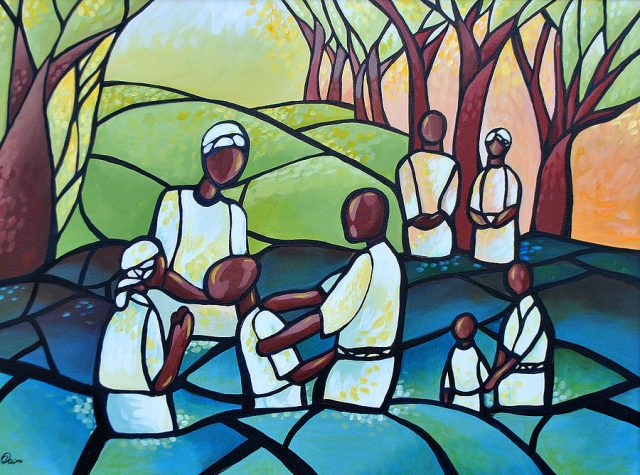This originally appeared at the Green Hills Philosopher, the blog of the Rev William Bellais

I had a conversation once with an angry man who said to me, “All the churches want is money.” Then he moved his fingers like he was feeling a coin or counting bills. Then, he claimed churches excluded people for all sorts of reasons, such as their looks, abilities, disabilities, status in the community, and politics. He said he thought Christians were supposed to be friendly and accepting. Then he laughed and added, “They want me to be baptized, what good is that?” He continued in his angry outburst by saying that he wanted to be a part of something like a church family but consistently rejected because he was not baptized.
His personal circumstance leading to his feelings of rejection by church communities were sad. While I understood what he was angry about and couldn’t apologize for the Church, I suppose, to defend the church where I could, my response was that being baptized is the entry into the family of the church—the Body of Christ. Then he objected, “They want me to be baptized as a Catholic, a Mormon, or a Baptist; I don’t want to be any of those things.” There I agreed. Baptism does not make us Episcopalians, Roman Catholics, or anything else. Baptism makes us members of the Body of Christ, and once we are baptized in water and in the Name of the Holy Trinity, we do not need to be baptized again to meet a denominational demand or custom.
Also in his anger, this man said there was nowhere in the Bible that says that you must be baptized. At that point, I held up my right hand and said, “Stop! You’re wrong!” There are places in the New Testament where baptism is explicitly made a part of the requirements for discipleship, to be a follower, of Christ. I pointed out that in the Gospel according to Matthew, at the very end of that Gospel, Jesus commands the apostles to baptize and make people his disciples. The Scripture is this;
All authority in heaven and on earth has been given to me. Go therefore and make disciples of all nations, baptizing them in the name of the Father and of the Son and of the Holy Spirit, and teaching them to obey everything that I have commanded you. And remember, I am with you always, to the end of the age” (28:18-29).
Additionally, I told the angry man, that in the Acts of the Apostles (in the story about the conversion of Cornelius the Centurion) Peter indicates that entry into the Body of Christ is baptism. After hearing Cornelius’ witness, Peter tells him to call his entire family to be baptized, and then Peter said, “Can anyone withhold the water for baptizing these people who have received the Holy Spirit just as we have?” So he ordered them to be baptized in the name of Jesus Christ (10:47, 48).
Also in the Acts of the Apostles is the story of Ethiopian treasurer to the Ethiopian Queen Candace. When the apostle Philip encounters the Ethiopian, he is reading a scroll of the Book of Isaiah. The Ethiopian asks Philip of whom is the prophet writing? Then Philip goes into the story of Jesus. When they encounter a pool of water on the Road to Gaza, the Ethiopian is baptized (8:27-36).
Further, in his Letters, Paul mentions baptism in several instances. Thus, I told the man, there is ample Scripture to support the need for baptism. Nevertheless, this angry man had a point. I agreed he had a valid argument and that ended the discussion.
While baptism is essential to being a part of the Body of Christ, the unbaptized can still be included in the community of the church. For example, early Irish Christians brought people into the Body of Christ by including the newcomer into the family of the church before baptism; it is a practice called Celtic Evangelism—the simple idea of hospitality.
I think the angry man who confronted me was talking about hospitality. Most of his life he has felt separated, left out, and sadly excluded, and for that reason, he hated the Church. He accused Christians of hypocrisy. He said, “They talk a lot about helping the poor, unconditional love, and about God’s grace, but none of that has touched my life.”
This conversation led me to consider my baptism and the Church in general. There was some truth in the man’s angry words. When you look about the Church—Protestant, Roman Catholic, non-denominational, evangelical there seems to be a lack of grave concern for people in the immediate sense. The concern often seems to be more about statistics, form, and rules than for the sacrifices Christ calls his followers to make. For example, the number of people saved at a revival, Sunday attendance figures, the money collected at last Sunday’s worship.

Baptism requires a Christian to walk in the footsteps of Jesus, to declare him Lord and to seek salvation in his name, and to respect the dignity of all human beings. Christians are called to a Radical Faith. Christians, when they live as though their baptisms matter, are radicals. Jesus was a radical. Peter and Paul and the apostles were radicals. The angry man had yet to encounter a Christian who was truly radical (I must include myself in that description).
A radical is one who advocates and works for fundamental or revolutionary changes in current practices, conditions.
In other words, that means that a Christian makes every effort to face the realities of our society and then takes steps to do what Jesus has commissioned his followers to do. Christians try to be open and available to those who need comforting, healing the sick, feeding the hungry, visiting the captive, and loving enemies and the persecutors. Further, Jesus’ disciples, Christians, are to avoid judging, allowing God to work in the lives of those considered outside the norm of “polite society.” Regardless of their conditions in life, no one’s dignity should be challenged.
Indeed the word Radical describes Jesus and his cousin John-the-Baptist. Thus, a radical faith is one that is beyond comfortable religion, discussions about theology and intellectual debate. It is a faith that pulls one out of the ordinary and accepted conventions of society and through that pull the faithful proclaim there is a Better Way. I love that phrase—a Better Way; that phrase comes from the 13th chapter of 1st Corinthians. The better way is the heart of the Christian faith. I am thinking of what the apostle Paul wrote to the church in Corinth. He lists all the things people think make them real followers of Christ—praying in tongues, prophesying, faith to move mountains, generosity, wisdom, martyrdom—and then he says there is a better way of being a Christian. All of those gifts listed are meaningless without love. From there he goes into his description of love and ends by listing the three Christian virtues, “faith, hope, and love,” but he finishes by saying, “The greatest of these is love (1 Corinthians 13); that is the Better Way—the Radical Way.
Jesus comes up out of the water a changed person. Both John and Jesus recognize that Jesus has been called to a new ministry, a radical ministry, a better way that will ultimately change the world.
That is also the hope of every baptism. The hope all those baptized will come out of the water a new person dedicated to the Better Way and Radical Faith of Jesus.
images: main image The Baptism by AC Williams, church image; Grace Church illuminated by William Bellais

